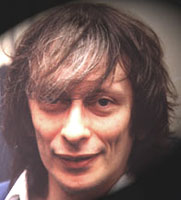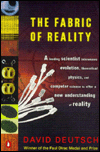|
David Deutsch

Recipient
of the 2005
$100,000 Edge of Computation Science Prize
"For individual scientific work, extending the computational idea,
performed, published, or newly applied within the past ten years"
DAVID DEUTSCH'S
research
in quantum physics has been influential and highly acclaimed. His papers
on quantum computation laid the foundations for that field, breaking
new ground in the theory of computation as well as physics, and have
triggered an explosion of research efforts worldwide.
His
1995 paper, "Conditional quantum dynamics and logic gates"
(with A. Barenco, A. Ekert and R. Jozsa) was an important step in clarifying
what sort of physical processes would be needed to implement quantum
computation in the laboratory, and what sort of things the experimentalists
should be trying to get to work.
"Universality
in quantum computation", also written in 1995 (with A. Barenco
and A. Ekert) proved the universality of almost all 2-qubit quantum
gates, thus verifying his conjecture made in 1989 and showing that quantum
computation and quantum gate operations are 'built in' to quantum physics
far more deeply than classical physics. In 1996, in "Quantum privacy
amplification and the security of quantum cryptography over noisy channels"
(with A. Ekert, R. Jozsa, C. Macchiavello, S. Popescu and A. Sanpera),
he brought quantum cryptography a little bit closer to being practical
as opposed to just a laboratory curiosity.
His
recent work as seen in the following three papers can be seen as new
"applications" of the computational idea, rather than extensions
of it.
In 2000, "Information Flow in Entangled Quantum Systems" (with
P. Hayden) refutes the long-held belief that quantum systems contain
'non-local' effects, and it does it by appealing to the universality
of quantum computational networks, and analysing information flow in
those.
Also in 2000, in "Machines, Logic and Quantum Physics" (with
A. Ekert and R. Lupacchini), a philosophic paper, not a scientific one,
he appealed to the existence of a distinctive quantum theory of computation
to argue that our knowledge of mathematics is derived from, and is subordinate
to, our knowledge of physics (even though mathematical truth is independent
of physics).
In 2002, he answered several long-standing questions about the multiverse
interpretation of quantum theory in "The Structure of the Multiverse"
— in particular, what sort of structure a 'universe' is, within
the multiverse. It does this by using the methods of the quantum theory
of computation to analyse information flow in the multiverse.
His two main lines of research at the moment , qubit field theory and
quantum constructor theory, may well yield important extensions of the
computational idea eventually, but at the moment neither of them has
yielded any results at all, to speak of, only promising avenues of research.
Born
in Haifa, Israel, David Deutsch was educated at Cambridge and Oxford
universities. After several years at the University of Texas at Austin,
he returned to Oxford, where he now lives and works. Since 1999, he
has been a non-stipendiary Visiting Professor of Physics at the University
of Oxford, where he is a member of the Centre for Quantum Computation
at the Clarendon Laboratory, Oxford University.
 In
1998 he was awarded the Institute of Physics' Paul Dirac Prize and Medal.
This is the Premier Award for theoretical physics within the gift of
the Council of the Institute of Physics. It is made for “outstanding
contributions to theoretical (including mathematical and computational)
physics”. In 2002 he received the Fourth International Award on
Quantum Communication for “theoretical work on Quantum Computer
Science”. In
1998 he was awarded the Institute of Physics' Paul Dirac Prize and Medal.
This is the Premier Award for theoretical physics within the gift of
the Council of the Institute of Physics. It is made for “outstanding
contributions to theoretical (including mathematical and computational)
physics”. In 2002 he received the Fourth International Award on
Quantum Communication for “theoretical work on Quantum Computer
Science”.
He is the author of The Fabric of Reality.
References:
"Conditional quantum dynamics and logic gates" (with A. Barenco,
A. Ekert and R. Jozsa) Phys. Rev. Lett. 74 4083-6 (1995)
"Universality
in quantum computation" (with A. Barenco and A. Ekert) Proc. R.
Soc. Lond. A449 669-77 (1995)
"Quantum privacy amplification and the security of quantum cryptography
over noisy channels" (with A. Ekert, R. Jozsa, C. Macchiavello,
S. Popescu and A. Sanpera) Phys. Rev. Lett. 77 2818-21 (1996)
"Information Flow in Entangled Quantum Systems" (with P. Hayden)
Proc. R. Soc. Lond. A456 1759-1774 (2000)
"Machines, Logic and Quantum Physics" (with A. Ekert and R.
Lupacchini) Bulletin of Symbolic Logic 3 3 (2000)
"The Structure of the Multiverse" Proc. R. Soc. Lond.A458
2028 2911-23 (2002)
Further
reading on Edge:
"It's Much Bigger Than It Looks" - A talk with David Deutsch
David Deutsch Wins
The $100,000 Edge of Computation Science Prize
Beyond
Edge:
David Deutsch's
Home Page
Lectures
on Quantum Computation
Centre for Quantum Computation
|

 In
1998 he was awarded the Institute of Physics' Paul Dirac Prize and Medal.
This is the Premier Award for theoretical physics within the gift of
the Council of the Institute of Physics. It is made for “outstanding
contributions to theoretical (including mathematical and computational)
physics”. In 2002 he received the Fourth International Award on
Quantum Communication for “theoretical work on Quantum Computer
Science”.
In
1998 he was awarded the Institute of Physics' Paul Dirac Prize and Medal.
This is the Premier Award for theoretical physics within the gift of
the Council of the Institute of Physics. It is made for “outstanding
contributions to theoretical (including mathematical and computational)
physics”. In 2002 he received the Fourth International Award on
Quantum Communication for “theoretical work on Quantum Computer
Science”.